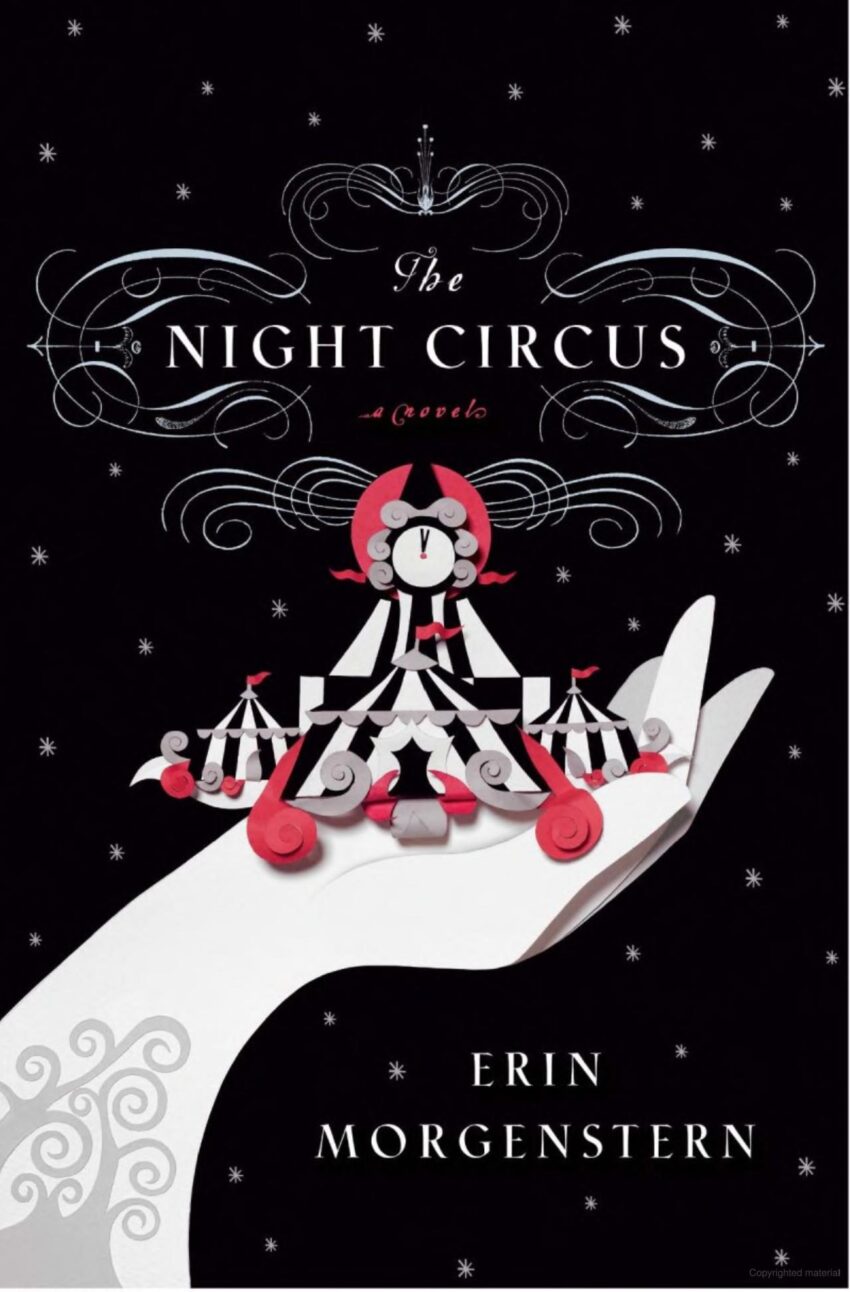 The Night Circus by Erin Morgenstern
The Night Circus by Erin Morgenstern
I’ve tried to read Morgenstern’s The Starless Sea a few times, and never quite managed to make it through. But I heard such glowing reviews of her novels that I had to keep trying, so I switched to The Night Circus. This book definitely worked for me. It moves quite a bit faster than The Starless Sea, but still keeps Morgenstern’s distinctly lush prose. The descriptions of the circus were striking and atmospheric, and the entire novel was underscored with a sense of foreboding that kept me reading to the end. The plot is so loosely strung together that at first, it’s hard to see how it all connects. But when all the elements finally come together, it’s brilliant and showstopping.
 I Who Have Never Known Men by Jacqueline Harpman
I Who Have Never Known Men by Jacqueline Harpman
This is one of those books that’s just so weird that it occupies your mind for a while after you finish. The novel explores an intriguing premise: “Deep underground, thirty-nine women live imprisoned in a cage. Watched over by guards, the women have no memory of how they got there, no notion of time, and only vague recollections of their lives before. As the burn of electric light merges day into night and numberless years pass, a young girl – the fortieth prisoner – sits alone and outcast in the corner. Soon she will show herself to be the key to the others’ escape and survival in the strange world that awaits them above ground.” The ending is honestly a little terrifying, but at the same time, you see it coming. After the last half of the story, it’s hard to expect a happy ending. Yet, at the same time, even in the bleak realities of the setting and situations, you manage to keep hoping and rooting for the characters. This book was excellent, definitely one of the better sci-fi/dystopian books I’ve read recently.
 Lincoln in the Bardo by George Saunders
Lincoln in the Bardo by George Saunders
This book is extremely hard to summarize, but I think that only adds to its brilliance. The narration alternates between individual play-like lines from our ghost narrators and actual excerpts from historical texts and primary sources. The whole novel takes place over the course of one night after the death of Abraham Lincoln’s son, Willie. It is incredible how Saunders managed to so beautifully communicate Lincoln’s emotions surrounding his son’s passing with only excerpts. The novel is extremely well-researched and intensely thoughtful. Though it may seem strange or confusing at first, at its heart, it’s a moving piece that discusses what it means to love and live when we’re temporary beings.
 Wuthering Heights by Emily Bronte
Wuthering Heights by Emily Bronte
If I made a “Hear Me Out” cake for literature, I feel like this one would go on it. Seriously, though, hear me out. I know it’s got this reputation for being boring, confusing, and pretentious. I get that. Was I confused at the beginning? Yes. Did I read the second half with a character chart open on my phone? Yes. Can I concisely explain why everyone has different variations of the same names? No, not at all. But, Wuthering Heights is the most suspenseful classic I’ve ever read—barring Agatha Christie. For the last half of the novel, I was on the edge of my seat. The events are genuinely so appalling that it was impossible to stop reading. Most of the characters are awful to each other, and it contains such timeless commentary on obsession and generational cycles. The novel teaches us—albeit, in a horrible and violent way—that we are shaped by our upbringings, a sentiment that is ever-relevant, no matter our situations.
 The Secret History by Donna Tartt
The Secret History by Donna Tartt
This book certainly lived up to its reputation! Like Wuthering Heights, it’s one of those where everything is so horrible that you can’t look away. The characters are awful and make so many bad decisions. The narrator is unreliable, which only adds to the suspense. A worthy pioneer for the dark academia subgenre and a thrilling, atmospheric tale, The Secret History certainly kept me turning the page.
 All The Light We Cannot See by Anthony Doerr
All The Light We Cannot See by Anthony Doerr
All the Light We Cannot See won a Pulitzer Prize for Fiction. I knew it was widely critically acclaimed before I began reading it, but it still managed to blow me away. I adored Marie-Laure, her love for mollusks, radios, her family, and Twenty Thousand Leagues Under The Sea. I loved being able to feel the seaside town of Saint Malo, especially after visiting a few years ago. Doerr manages to incorporate extensive sensory detail in a lyrical style, juxtaposing the beauty of nature with the destruction of war. It’s a gorgeous novel, and one I think we’ll be reading for a long, long time.
Devotions: The Selected Poems of Mary Oliver arranged + written by Mary Oliver
This was the last book I read in 2024, and fittingly, the last book in this review. There’s something so earnest in her poetry. It’s very simple, no hidden metaphors or difficult vocabulary. No rhyme scheme, little rhythm. But it’s perfect like that. Her poems celebrate, after all, a simple life. She doesn’t say that we need to move a mountain, cure a disease, or save the world. Instead, Oliver imparts something that so many of us dearly need to hear: that the greatest ambition of all is to appreciate the small things. I adored this book, through and through. Here’s a line from my journal that I think best summarizes it: “It’s peaceful, and feels a little sacred when you turn the page, which is, I think, what I mostly want from a poetry book.”








